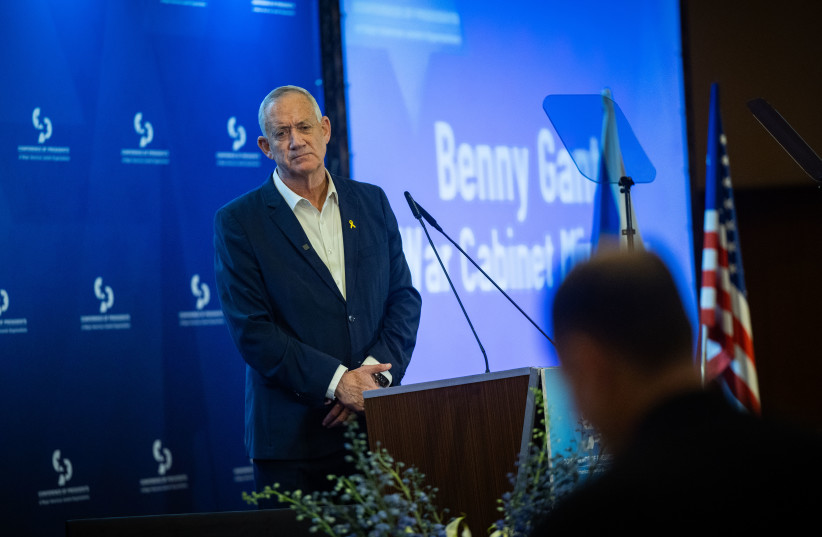It could take a “year, a decade, and a generation” to transform Gaza, Minister Benny Gantz (National Unity) told the Conference of Presidents in Jerusalem as he rejected calls for unilateral Palestinian statehood.
“War now, peace later,” Gantz said, as he stressed the importance of eliminating the terror group after close to two decades in which Israel tried every option to contain it.
“We have tried everything but eliminating Hamas,” said Gantz, who is a former IDF chief of staff and a former minister of defense.
Lasting peace in the region could take a 'generation,' Gantz says
Israel is “facing a very long journey to change the reality in Gaza and from Gaza,” explained Gantz, who is also a member of the war cabinet.
“I would dare to say it would take a year, a decade, and a generation,” Gantz stated. He described a slow, painstaking process to transform the enclave’s governance and to ensure that Hamas is eliminated and does not regain control of Gaza.

“A year of getting in and getting out, getting in and getting out,” Gantz elaborated, as he explained that it would get easier and could be done with decreasing military force.
At the same time, governance must be rebuilt in Gaza, taking into account that Gaza can’t be ruled by Israel or Hamas, described Gantz.
The Norwegians, the Americans are not going to rule Gaza, said Gantz, stressing that “no one is coming.”
Israel should retain security control, but that is less an issue than the question of who is in charge of services, such as food, water, and medicine for the Palestinians living in Gaza, he said.
If Hamas remains as a service provider in Gaza, then it would also retain control of Gaza, said Gantz, who advocated a form of local unaffiliated Palestinian governance supported by a regional coalition. None of these parties can have any links to Hamas, he stressed.
During the next decade, Israel could then agree to the development of the Strip – including irrigation, industry, and other aspects, Gantz said.
Gantz, who is more popular than Prime Minister Benjamin Netanyahu in electoral polls, spoke of a prolonged process at a time when the international community is pressing to speed up a peace process for a two-state resolution to the conflict that would see a reformed Palestinian Authority in charge of Gaza, the West Bank and east Jerusalem.
Long-term, lasting peace could take a generation to achieve, Gantz said.
“It is through facilitating long-term processes that will consolidate a regional architecture facing the Iranian axis of terror, and by advancing international arrangements that will improve the lives of people throughout the region and promote stability and peace,” Gantz said.
In the meantime, the US should refrain from one-sided decisions, he said.
“After October 7, the pathway to regional stability and peace is not through one-sided actions like recognition of a Palestinian state,” said Gantz, but rather through victory over Hamas,
He arrived at the Conference of Presidents just after the government issued a directive against unilateral Palestinian statehood.
“We must win this war. For that to happen – we need time,” Gantz told the conference, as he also addressed the issue of the 134 remaining hostages Hamas is holding in Gaza.
He issued a warning to Hamas, stating, “The world must know, and Hamas leaders must know – if by Ramadan our hostages are not home – the fighting will continue to the Rafah area.
“We will do so in a coordinated manner, facilitating the evacuation of civilians in dialogue with our American and Egyptian partners to minimize civilian casualties.
“But to those saying the price is too high – I say this very clearly: Hamas has a choice. They can surrender, release the hostages, and this way, the citizens of Gaza can celebrate the holy holiday of Ramadan,” Gantz stated.
“Let me be clear, we are operating in Gaza not out of revenge for October 7, but out of a clear conviction to secure our future – the future of Israel’s next generations,” Gantz said.
Gantz's vision for the course of conflict
Israel has four goals in its current conflict, he explained.
“The First – A military victory. Removing the threat Hamas and Hezbollah pose to our communities;
The Second – the return of our hostages; The Third – A diplomatic victory – replacing the Hamas regime completely.”
This would include a “great change in the Palestinian education system, the uncompromising removal of content preaching terror and Israel hate.”
The fourth, Gantz said, was to restore a sense of togetherness amongst Israel’s citizens after the divisiveness brought about by the government’s judicial reforms during 2023.
